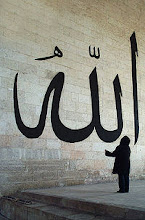 Bismillah walhamdulillah wa-salaatu wa-salaamu 'ala Sayyidina Muhammad wa 'ala alihi wa-ashabihi wa-salaam tasliman kathira
Bismillah walhamdulillah wa-salaatu wa-salaamu 'ala Sayyidina Muhammad wa 'ala alihi wa-ashabihi wa-salaam tasliman kathiraBrothers and sisters in iman:
Allah - the Most Perfect, the Most High responded to the du'a (supplication) of His Prophet Ibrahim 'alayhi salaam when he said:
"Our Lord! Send to them a Messenger from themselves, reciting to them Your Signs, teaching them the Book and the Wisdom and purifying them. Indeed You are the Most Powerful, the Most Wise." -Surah al-Baqarah 2:129
So Allah - the Mighty and Majestic - said:
"It is Allah who has sent to the unlettered people a Messenger from amongst themselves, reciting to them His Signs, purifying them and teaching them the Book and the Wisdom, whereas before that, they had been in clear misguidance." -Surah al-Jumu'ah 62:2
So here the Prophet salallahu 'alayhi wa salaam has been characterized with two tasks: ta'leem (teaching) and tazkiyah (purification). In his request, Ibrahim 'alayhi salaam mentioned ta'leem before tazkiyah. However, Allaah - the Mighty and Majestic - answered him, but by giving tazkiyah precedence to ta'leem.
And Allaah blessed the Believers by sending the Messenger who carried out these two tasks, so He - the Mighty and Majestic - said:
"As We sent to you a Messenger from amongst yourselves, reciting to you Our Signs, purifying you, and teaching you the Book and the Wisdom, that which you did not know." -Surah al-Baqarah 2:151
So in this ayah also, Allah - the Mighty and Majestic - mentions purification before teaching. Thus, as is known, purification is one of the fruits of acting upon knowledge; and that knowledge causes harm for its possessor if it is not accompanied by action. Indeed, whosoever increases in knowledge, but does not increase in taqwa (piety, fear and obedience to Allah), then let him be suspicious about his knowledge.
Imam Ibn al-Qayyim (d.751H) rahimahullah - said: "The Scholar who does not act upon his knowledge, will be punished before the worshippers of idols."
And our Salaf (Pious Predecessors) used to inherit purification from each other, as part of good and fine manners. This was due to their sitting with the Shaykh and accompanying him. So 'Abdullah ibn Maslamah al-Qa'nabi (d.221H) said: "We used to sit with Imam Malik and take from his manners and conduct, just as we would take from his knowledge." [2]
However, in the later generations, Shari'ah knowledge has almost become restricted to just colleges and universities and sitting in front of the doctors and teachers for short periods of time. So the students do not take any benefit from good manners and conduct - even if those teachers have a share of it. And we often see and hear about many shortcomings of both the students and the teachers! Thus, the religion has become weak, yaqeen (certainty of faith) has dwindled, sabr (patient perseverance) - with its wide Islamic understanding - has passed away, as has az-zuhd (praiseworthy abstinence from this world) except for those whom my Lord has mercy upon.
So knowledge alone, without good manners and conduct, will not produce any fruit in a way that the people can be benefited by its possessor - from what is seen and what is spoken. And through seeking knowledge alone, the Muslims will not be saved from hypocrisy. Rather, seeking knowledge must be accompanied by good manners and conduct, so that he remains safe, derives benefit and is saved from sin and its causes, and also from being burdened. This is attested to by what at-Tirmidi relates:
The Prophet salallahu 'alayhi wa salam said: "There are two qualities which do not come together in a munafiq (hypocrite): Good manners and conduct, and the understanding of the deen (religion)." [3]
So in this hadeeth, good manners and conduct are mentioned before understanding of the religion. Indeed, the greatest and most valuable fruits of purification are sabr (patience) and zuhd (praiseworthy abstinence from this world). Whilst the greatest and most precious fruits of 'ilm (knowledge) is yaqeen (certainty). So he who gains both patience and certainty, in this way, then he is one of the leaders of the religion, and this is testified to by the saying of Allaah - the Most High:
"We made from them leaders, giving guidance by Our Command, because they had sabr (patient perseverance) and had yaqeen (certainty) in Our Signs." -Surah Sajdah 32:24
So patience is the fruit of purification, whilst certainty is the fruit of knowledge and teaching.
And here also patience is mentioned before certainty. Sheikh ul-Islaam Ibn Taymiyyah (d.728H) used to say: "Through sabr and yaqeen leadership in the religion is attained." [4]
Indeed! That is so because he who gains them both, then he has attained and actualised the two tasks of Allah's Messenger salallahu 'alayhi wa salam, and has thus become an inheritor of the Prophet - and the Prophet salallahu 'alayhi wa sallam is the leader of all the leaders.
Finally, we must draw attention to the Fact that the Salafus-Saaliheen (Pious Predecessors) - may Allaah be pleased with them all - actualised these two tasks and therefore they acheived rectification of themselves and rectification of others. 'Abdullaah ibn al-Mubaarak (d.181H) used to say: "The latter part of this Ummah will not be rectified, except by that which rectified its first part: zuhd and yaqeen."
And zuhd cannot be attained except by means of sabr, which cannot be attained except through tazkiyah (purification). And yaqeen cannot be attained except through purified Sharee'ah knowledge.
So would that we had realized that our misfortune lies in the absence of these two matters from our lives, and that he who calls to them, persisting in this and refusing to be pre-occupied from them by anything else, then he is upon the correct manhaj (methodology) and upon The Straight Path.
Footnotes:
1. This article was taken from Al-Asaalah magazine (no.10 / Shawaal 1414H).
2. The likes of this has been related by adh-Dhahabee in Siyaar A'laamun-Nubalaa (3/285).
3. Saheeh: Related by at-Tirmidhee (no.2837), from Abu Hurayrah radiallaahu 'anhu. It was authenticated by Shaykh al-Albaanee in as-Saheehah.
4. Related by Ibn al-Qayyim in Madaarijus-Saalikeen (1/132).
References:
Shaykh Mashur ibn Hasan
This article was taken from Al-Asaalah magazine (no.10 / Shawaal 1414H)
Source: Al-Istiqaamah Magazine , Issue No.2 - Safar 1417H / July 1996














